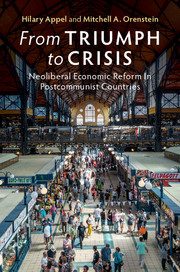Crossref Citations
This Book has been
cited by the following publications. This list is generated based on data provided by Crossref.
Buzogány, Aron
and
Varga, Mihai
2018.
The ideational foundations of the illiberal backlash in Central and Eastern Europe: the case of Hungary.
Review of International Political Economy,
Vol. 25,
Issue. 6,
p.
811.
Cianetti, Licia
Dawson, James
and
Hanley, Seán
2018.
Rethinking “democratic backsliding” in Central and Eastern Europe – looking beyond Hungary and Poland.
East European Politics,
Vol. 34,
Issue. 3,
p.
243.
Appel, Hilary
2018.
How Neoliberal Reforms Lose Their Partisan Identity: Flat Tax Diffusion in Eastern Europe and Post-Soviet Eurasia.
Europe-Asia Studies,
Vol. 70,
Issue. 7,
p.
1121.
Heneghan, Martin
and
Orenstein, Mitchell A
2019.
Organizing for impact: International organizations and global pension policy.
Global Social Policy,
Vol. 19,
Issue. 1-2,
p.
65.
Bohle, Dorothee
and
Greskovits, Béla
2019.
Politicising embedded neoliberalism: continuity and change in Hungary’s development model.
West European Politics,
Vol. 42,
Issue. 5,
p.
1069.
Pavlović, Dušan
2019.
When do neoliberal economic reforms cause democratic decline? Evidence from the post-communist Southeast Europe.
Post-Communist Economies,
Vol. 31,
Issue. 5,
p.
671.
Doshi, Rush
Kelley, Judith G.
and
Simmons, Beth A.
2019.
The Power of Ranking: The Ease of Doing Business Indicator and Global Regulatory Behavior.
International Organization,
Vol. 73,
Issue. 03,
p.
611.
Appel, Hilary
2019.
Can the EU Stop Eastern Europe's Illiberal Turn?.
Critical Review,
Vol. 31,
Issue. 3-4,
p.
255.
Scheiring, Gábor
2020.
The Retreat of Liberal Democracy.
p.
51.
Scheiring, Gábor
and
Szombati, Kristóf
2020.
From neoliberal disembedding to authoritarian re-embedding: The making of illiberal hegemony in Hungary.
International Sociology,
Vol. 35,
Issue. 6,
p.
721.
Reptova Novakova, Zuzana
and
van der Maesen, Laurent
2020.
Editorial.
The International Journal of Social Quality,
Vol. 10,
Issue. 2,
p.
vii.
Doshi, Rush
Kelley, Judith G.
and
Simmons, Beth A.
2020.
The Power of Global Performance Indicators.
p.
25.
Rogers, Samuel
2020.
Hungarian authoritarian populism: a neo-Gramscian perspective.
East European Politics,
Vol. 36,
Issue. 1,
p.
107.
Scheiring, Gábor
2020.
The Retreat of Liberal Democracy.
p.
311.
Havrylyshyn, Oleh
2020.
Present at the Transition.
Chandler, Andrea
2020.
Populism and Social Policy: A Challenge to Neoliberalism, or a Complement to It?.
World Affairs,
Vol. 183,
Issue. 2,
p.
125.
Bluhm, Katharina
and
Varga, Mihai
2020.
Conservative Developmental Statism in East Central Europe and Russia.
New Political Economy,
Vol. 25,
Issue. 4,
p.
642.
Cianetti, Licia
Dawson, James
and
Hanley, Seán
2020.
Rethinking ‘Democratic Backsliding’ in Central and Eastern Europe.
p.
1.
Anna Vachudova, Milada
2020.
Ethnopopulism and democratic backsliding in Central Europe.
East European Politics,
Vol. 36,
Issue. 3,
p.
318.
Sanghera, Balihar
and
Satybaldieva, Elmira
2020.
The other road to serfdom: The rise of the rentier class in post-Soviet economies.
Social Science Information,
Vol. 59,
Issue. 3,
p.
505.





